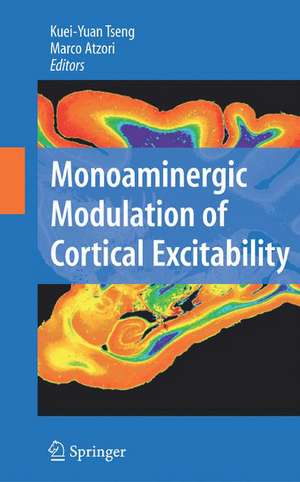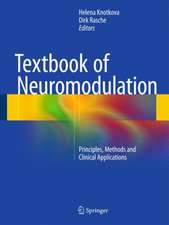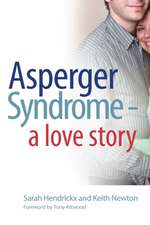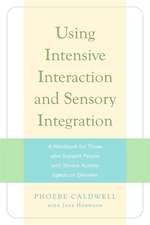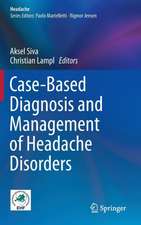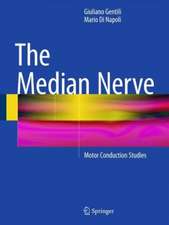Monoaminergic Modulation of Cortical Excitability
Editat de Kuei-Yuan Tseng, Marco Atzorien Limba Engleză Hardback – 13 aug 2007
| Toate formatele și edițiile | Preț | Express |
|---|---|---|
| Paperback (1) | 946.55 lei 6-8 săpt. | |
| Springer Us – 3 noi 2010 | 946.55 lei 6-8 săpt. | |
| Hardback (1) | 949.90 lei 6-8 săpt. | |
| Springer Us – 13 aug 2007 | 949.90 lei 6-8 săpt. |
Preț: 949.90 lei
Preț vechi: 1158.41 lei
-18% Nou
Puncte Express: 1425
Preț estimativ în valută:
181.77€ • 194.37$ • 151.55£
181.77€ • 194.37$ • 151.55£
Carte tipărită la comandă
Livrare economică 18 aprilie-02 mai
Preluare comenzi: 021 569.72.76
Specificații
ISBN-13: 9780387722542
ISBN-10: 0387722548
Pagini: 329
Ilustrații: X, 329 p. 58 illus., 3 illus. in color.
Dimensiuni: 155 x 235 x 22 mm
Greutate: 0.57 kg
Ediția:2007
Editura: Springer Us
Colecția Springer
Locul publicării:New York, NY, United States
ISBN-10: 0387722548
Pagini: 329
Ilustrații: X, 329 p. 58 illus., 3 illus. in color.
Dimensiuni: 155 x 235 x 22 mm
Greutate: 0.57 kg
Ediția:2007
Editura: Springer Us
Colecția Springer
Locul publicării:New York, NY, United States
Public țintă
Professional/practitionerDescriere
Monoaminergic Modulation of Cortical Excitability serves as an integrative and comprehensive comparison of the diverse and complex modulatory action of dopamine, noradrenaline, and serotonin receptors in the cortex. The volume is organized into several sections offering a broad spectrum of opinions on how the monoamine systems affect cortical function from a cellular/sub-cellular level to a system level. The complexity of these interactions are discussed in light of recent data showing how disruption of these systems dramatically affects the memory formation and information processing in the cortex.
About the Editors:
Dr. Kuei Y. Tseng is Assistant Professor in the Department of Cellular and Molecular Pharmacology at Rosalind Franklin University of Medicine and Science, The Chicago Medical School, North Chicago, IL, USA. Dr. Marco Atzori is Assistant Professor at the School for Behavioral and Brain Sciences at the University of Texas, Dallas, TX, USA.
About the Editors:
Dr. Kuei Y. Tseng is Assistant Professor in the Department of Cellular and Molecular Pharmacology at Rosalind Franklin University of Medicine and Science, The Chicago Medical School, North Chicago, IL, USA. Dr. Marco Atzori is Assistant Professor at the School for Behavioral and Brain Sciences at the University of Texas, Dallas, TX, USA.
Cuprins
Section I Anatomical Studies of the Monoaminergic System: The Discovery of Multiple Serotonin Receptor Subtypes: A Lesson from Molecular Cloning to Functional Expression.- Distribution of D1-like and D2 Receptors in the Monkey Brain: Implications for Cognitive function in Schizophrenia.- Anatomical Characteristics of Norepinephrine Axons in the Prefrontal Cortex: Unexpected Findings That May Indicate Low Activity State in Naïve Animals.- Section II Monoaminergic Regulation of Cortical Function: Serotonin Modulation of Cortical Activity.- Serotonerigic Regulation of NMDA Receptor Trafficking and Function in Prefrontal Cortex.- Cross-Modulation Between GABAB and 5-HT Receptors: A Link Between Anxiety and Depression?- Serotonin Involvement in Plasticity of the Visual Cortex.- Cellular Mechanisms of Working Memory and its Modulation by Dopamine in the Prefrontal Cortex of Primates and Rats.- Dopamine D1 and Glutamate N-Methyl-D-Aspartate Receptors: An Essential Interplay in Prefrontal Cortex Synaptic Plasticity.- Prefrontal Cortical Synaptic Plasticity: The Roles of Dopamine and Implication for Schizophrenia.- Acquiring the Excitatory and the Inhibitory Action of Dopamine in the Prefrontal Cortex During Postnatal Development.- Dopamine and Noradrenaline Coupling in the Cerebral Cortex.- Regulation of Cortical Functions by the Central Noradrenergic System: Emerging Properties from an Old Friend.- Neuromodulation of Cortical Synaptic Plasticity.- Section III Computational Analyses of Cortical Monoaminergic Function: Dopaminergic Modulation of Prefrontal Cortex Network Dynamics.- Stable and Unstable Activation of the Prefrontal Cortex with Dopaminergic Modulation.- Dopamine and Norepinephrine Modulation of Cortical and Sub-Cortical Dynamics During Visuomotor Learning.- Section IV Monoamines and Psychiatric Disorders: Basal Ganglia – Cortex Interactions: Regulation of Cortical Function by D1 DopamineReceptors in the Striatum.- Interplay Between Dopamine and Acetylcholine in the Modulation of Attention.- Monoamine-Based Treatments in Schizophrenia: Time to Change the Paradigm?- Prefrontal Cortical Circuits and Schizophrenia Pathophysiology.- Index.
Textul de pe ultima copertă
Monoaminergic Modulation of Cortical Excitability serves as an integrative and comprehensive comparison of the diverse and complex modulatory action of dopamine, noradrenaline, and serotonin receptors in the cortex. The volume is organized into several sections offering a broad spectrum of opinions on how the monoamine systems affect cortical function from a cellular/sub-cellular level to a system level. The complexity of these interactions are discussed in light of recent data showing how disruption of these systems dramatically affects the memory formation and information processing in the cortex.
About the Editors:
Dr. Kuei Y. Tseng is Assistant Professor in the Department of Cellular and Molecular Pharmacology at Rosalind Franklin University of Medicine and Science, The Chicago Medical School, North Chicago, IL, USA. Dr. Marco Atzori is Assistant Professor at the School for Behavioral and Brain Sciences at the University of Texas, Dallas, TX, USA.
About the Editors:
Dr. Kuei Y. Tseng is Assistant Professor in the Department of Cellular and Molecular Pharmacology at Rosalind Franklin University of Medicine and Science, The Chicago Medical School, North Chicago, IL, USA. Dr. Marco Atzori is Assistant Professor at the School for Behavioral and Brain Sciences at the University of Texas, Dallas, TX, USA.
Caracteristici
Reviews important cellular and synaptic mechanisms by which dopamine, noradrenaline and serotonin receptors regulate cortical excitability and plasticity during critical periods of postnatal development
Discusses and establishes the link between mechanisms coupling these monoamine actions on biophysical properties of cortical neurons and synapses to its potential computational role in cortical functions
Provides new insights on how disruption of these interactions will affect dramatically the memory formation and information processing in the cortex
Will be of interest to a broad audience of neuroscientists from cellular and system physiology to behavior researchers
Can be used as a supplementary text for courses in neuroanatomy, neurophysiology, cellular and molecular pharmacology, pathophysiology of psychiatric disorders, and experimental psychology
Discusses and establishes the link between mechanisms coupling these monoamine actions on biophysical properties of cortical neurons and synapses to its potential computational role in cortical functions
Provides new insights on how disruption of these interactions will affect dramatically the memory formation and information processing in the cortex
Will be of interest to a broad audience of neuroscientists from cellular and system physiology to behavior researchers
Can be used as a supplementary text for courses in neuroanatomy, neurophysiology, cellular and molecular pharmacology, pathophysiology of psychiatric disorders, and experimental psychology
